Hello everyone,
You’ll notice that this week I’m talking more about movies than about books. While I object to the idea that watching film and TV is by nature a passive activity,* I have been struggling to work up the concentration and attention to do the serious reading that I fully expected to do while unemployed and unencumbered. I’m like Burgess Meredith in The Twilight Zone: I have “Time Enough at Last” but can’t read.
Meredith, in that episode, doesn’t much mind the destruction of the world and the death of everyone he knows; it’s the loss of his glasses, not the loss of friends, colleagues, spouse, and everyone on the planet that ruins him. I don’t wear glasses; it’s my anger and frustration and sorrow and guilt and worry that have kept my nose out of my books.
On Twitter, email etiquette and coronavirus language have become dark running jokes; we all know that no emails are “finding you well” these days. That said, I hope you’re all doing as well as can be “under the circumstances” and “in these unprecedented times” and “as we face these challenges” “together apart.”
This week in together apartness, I was touched by a gesture from my roommate, who I haven’t seen in two months. I’d asked her to forward me some important bills; she said she would, then sent, quite unprompted, every package and piece of mail I’ve received over the last few months. She didn’t need to do it, but the surprise delivery made my day and occupied my afternoon. It was a small thing that felt big.
Best wishes,
-Matt
*If you’ve never read Martin Scorsese on “interacting” with film, do take a look
Books
Bring Up the Bodies by Hilary Mantel (Henry Holt)
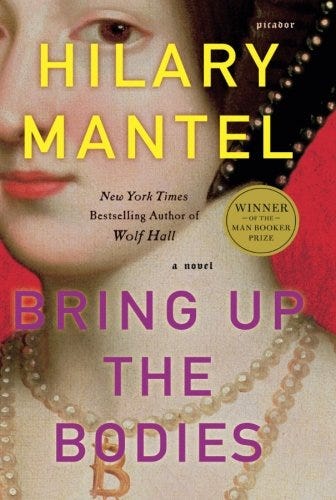
I’m told that The Mirror & the Light, the final volume of Mantel’s Cromwell trilogy, has slow portions. That book covers the last several years of its antihero’s life; Bring Up the Bodies covers just a few weeks and has no slack at all. Two-thirds the length of its predecessor and half the size of its sequel, this book flies. I think that speed is in part the subject of the book. Treasonous notions about Anne Boleyn transform overnight into the official story; as quick as a thought, the inviolable queen becomes the wretched concubine and betrayer. Something lethal to profess one day becomes fatal to deny the next.
That a reader should leave this book, about a man orchestrating a woman’s downfall and death under dubious pretenses and for political reasons, still feeling essentially sympathetic to Cromwell is evidence of Hilary Mantel’s mastery. Thomas More, whose death ends Wolf Hall, would do terrible things for revealed truth; Thomas Cromwell does terrible things to truth. With friends and family, he’s the soul of civility, a paragon of generosity, and a harbinger of modernity. In his official capacity, he shapes and enforces King Henry’s whims.
I don’t yet know what I’ll feel when I read the account of Cromwell’s destruction in the final book. Cromwell’s enemies think the boy from Putney has climbed too high; today’s readers may think he has stooped too low.
99 Glimpses of Princess Margaret by Craig Brown (FSG)
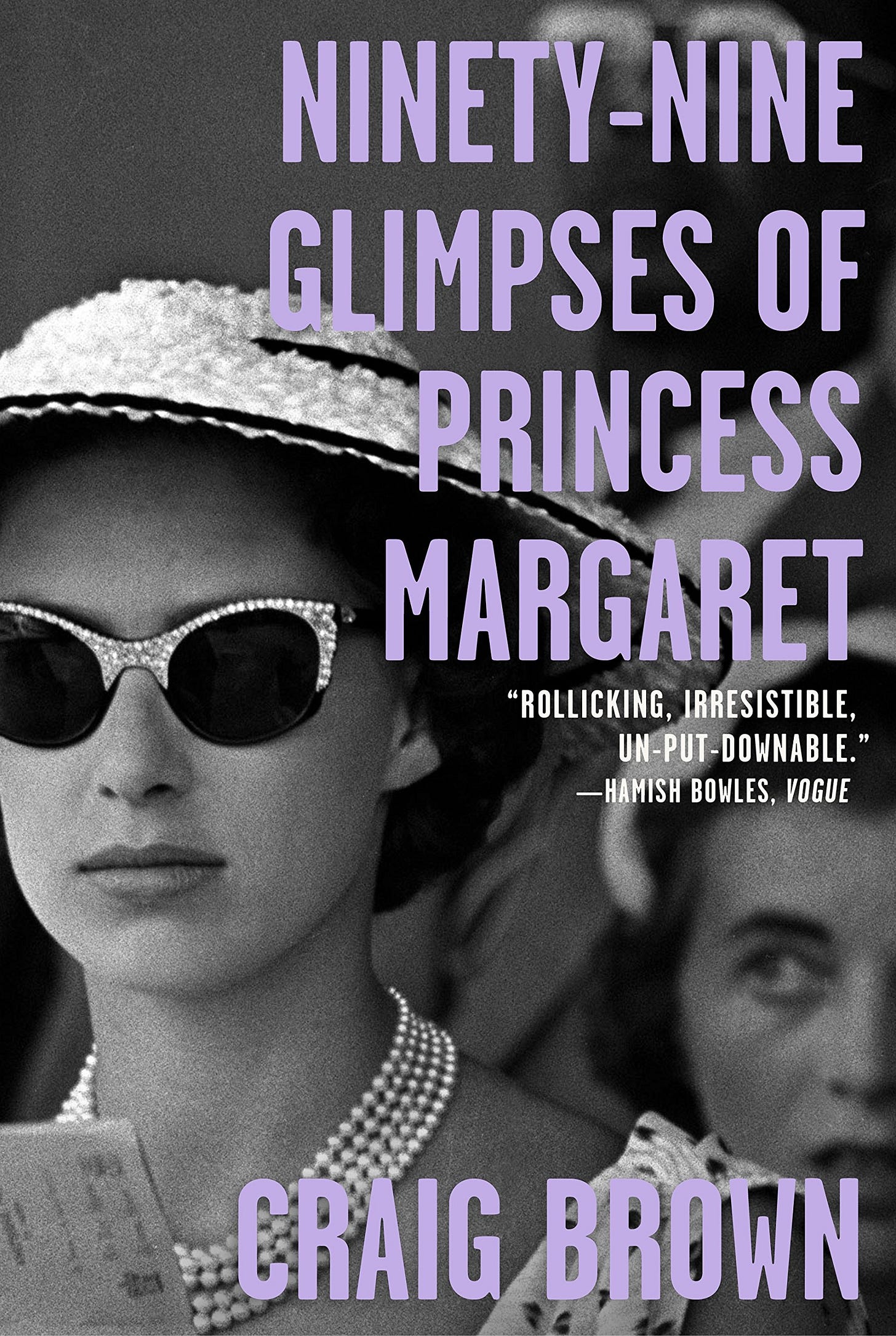
I’m still in the middle of this book, as its structure makes it easy to read a chapter or two, put the book aside, and then return later. I mean that as a compliment, not a criticism: Although the book does broadly follow the trajectory of Margaret’s life, the book would be nearly as enjoyable reshuffled and read at random. Brown began the book when he noticed Princess Margaret’s near-omnipresence in diaries, newspapers, and memoirs: Margaret seemed to be everywhere in the middle of this century, and she was a great generator of anecdote.
Because these are “glimpses,” not the chronological pieces of a traditional biography, Brown ranges freely. An early piece, contrasting the conversational styles of Princess Margaret and her older sister Queen Elizabeth, includes an excruciating account of Brown’s single meeting with the Queen in the mid-nineteen-seventies: He talked Her Majesty’s ear off, missed every conversational cue, and nearly backed her into a corner as he opined about German theater. One chapter examines Margaret’s eventual husband as a proto-metrosexual; another produces, Rashomon-style, three tellings of a single, distinctly minor anecdote about a cruel remark of Princess Margaret’s and tries to determine which is most plausible. Another chapter details Pablo Picasso’s erotic fascination with Her Royal Highness. A few glimpses are counterfactuals (What if Picasso had married Margaret?) and one chapter is even an homage to Raymond Queneau’s Exercises in Style, retelling an insignificant anecdote in dozens of styles (e.g. “Comical,” “Statistical,” “Discreet,” “Alliterative,” “Confrontational,” “Gastronomic,” “Blurb,” even “Multiple Choice”).
This is a very funny book, but also a sad one. A royal life may not, in the end, seem worth living.
Movies
Sunshine (2007, d. Danny Boyle) (Watched on Blu-Ray, but available for rental)
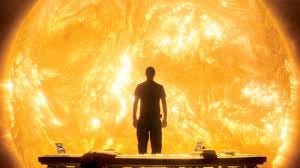
Wikipedia tells me that Danny Boyle took cues from Tarkovsky’s Solaris for this space film, but I’m not quite sure what the Brit master of frenetic cutting and canted angles, whose style often seems to be his substance, learned from the contemplative Soviet filmmaker.
In the 2060s, the sun is dying. Cillian Murphy, Rose Byrne, Michelle Yeoh, and Chris Evans are among the crewmembers of a spaceship sent to launch a mega-nuke into the sun in the hopes of restarting it. Things go wrong, then they go very wrong, then they go still wronger.
I liked this one, and particularly enjoyed the changing dynamics of the ill-fated ship’s crew, but it aspires to a sense of science fictional wonder that it never achieves, and that its inspirations, like 2001 and Alien, and some successors, like Interstellar or Ad Astra, manage.
Worth watching, but not a major entry in what I like to think of as the space-sublime genre. (If any readers have suggestions for underappreciated entries in this genre, do please tell me.)
Cops and Robbers (1973, d. Aram Avakian) (Watched on Blu-Ray)
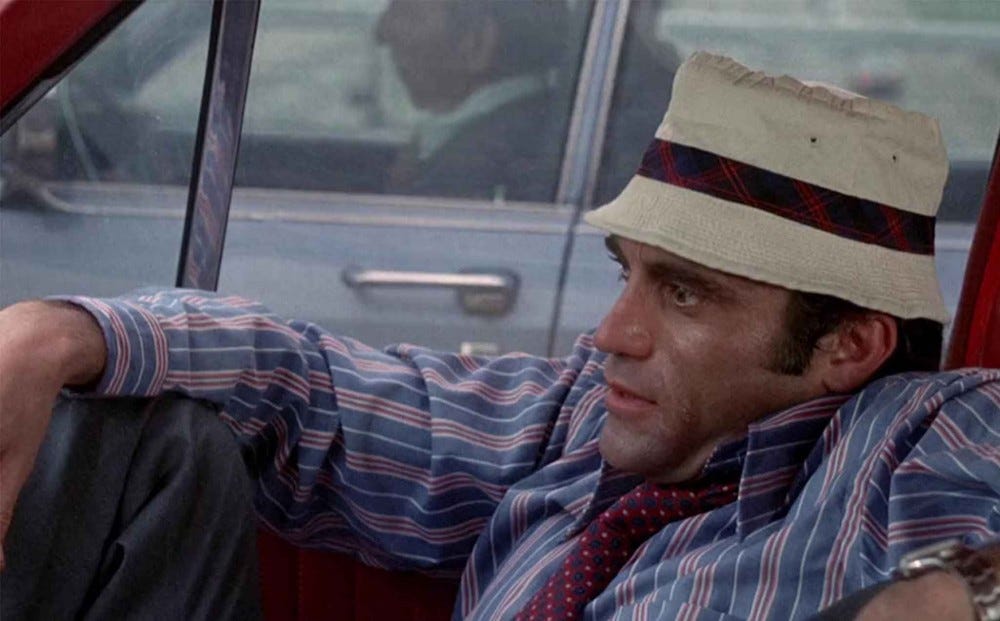
A patently minor film, based on an original screenplay by Donald Westlake which he adapted into a novel that was released in tandem with the film. Two blue collar NY cops have spent too long in Queens traffic jams in un-air-conditioned cars, and so they turn to crime. It’s a little bit of a heist film, a little bit of 70s NY slice-of-life, a little bit of comedy (funny smirk, not funny ha-ha).
I watched this because I’m a big Westlake fan and had heard it was good. It is good, though I’m not going to run out and recommend it to everyone I know. It’s a shame it’s not currently streaming: Cops and Robbers was shot entirely on location in New York, and it would make great pre-quarantine time capsule viewing.
Edge of Eternity (1959, d. Don Siegel) (Watched on Blu-Ray)
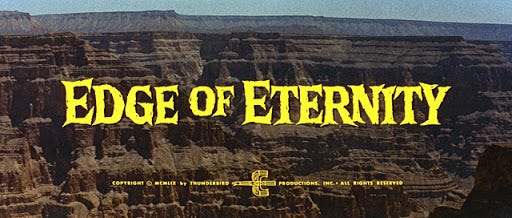
Bad news first: This film isn’t streaming, the Blu-Ray is out-of-print, and the company that manufactured the Blu-Ray just announced that it’s closing.
Good news: This is a fantastic little film full of big vistas. Arizona cop Cornel Wilde works in a little town near the Grand Canyon; people start dying and distracting him from his romance with gold mine heiress Victoria Shaw.
The opening credits trumpet that Edge of Eternity was filmed in and around the Grand Canyon; this is a vacation-with-plot picture; the scenery is supposed to be the main star. But Siegel, who went on to direct Dirty Harry and had already directed the original Invasion of the Body-Snatchers, was a great director working with talented actors, and so the plot and characters interest.
There are great widescreen panoramas of the Grand Canyon throughout, and plenty of small-town Southwestern Americana to admire. The final scene, a fight over the canyon atop, around, and dangling from a guano mine’s industrial bucket (!!) is quite stunning.
It also leads to the most improbable “special thanks” I’ve yet to see in a film. (Apologies for the quality of the image)
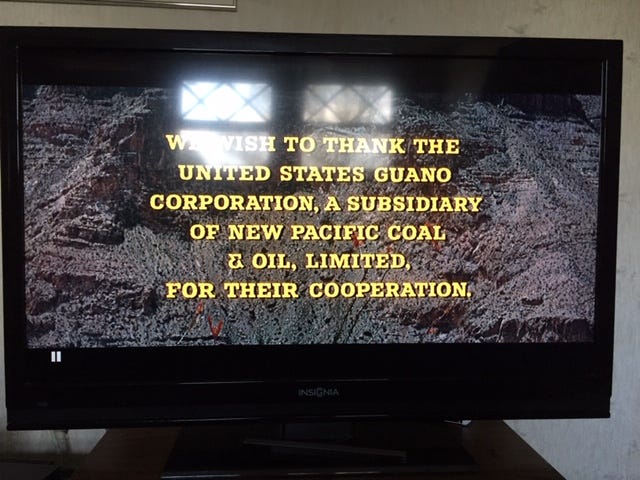
The Jesus Rolls (2019, d. John Turturro) (Rented on streaming)
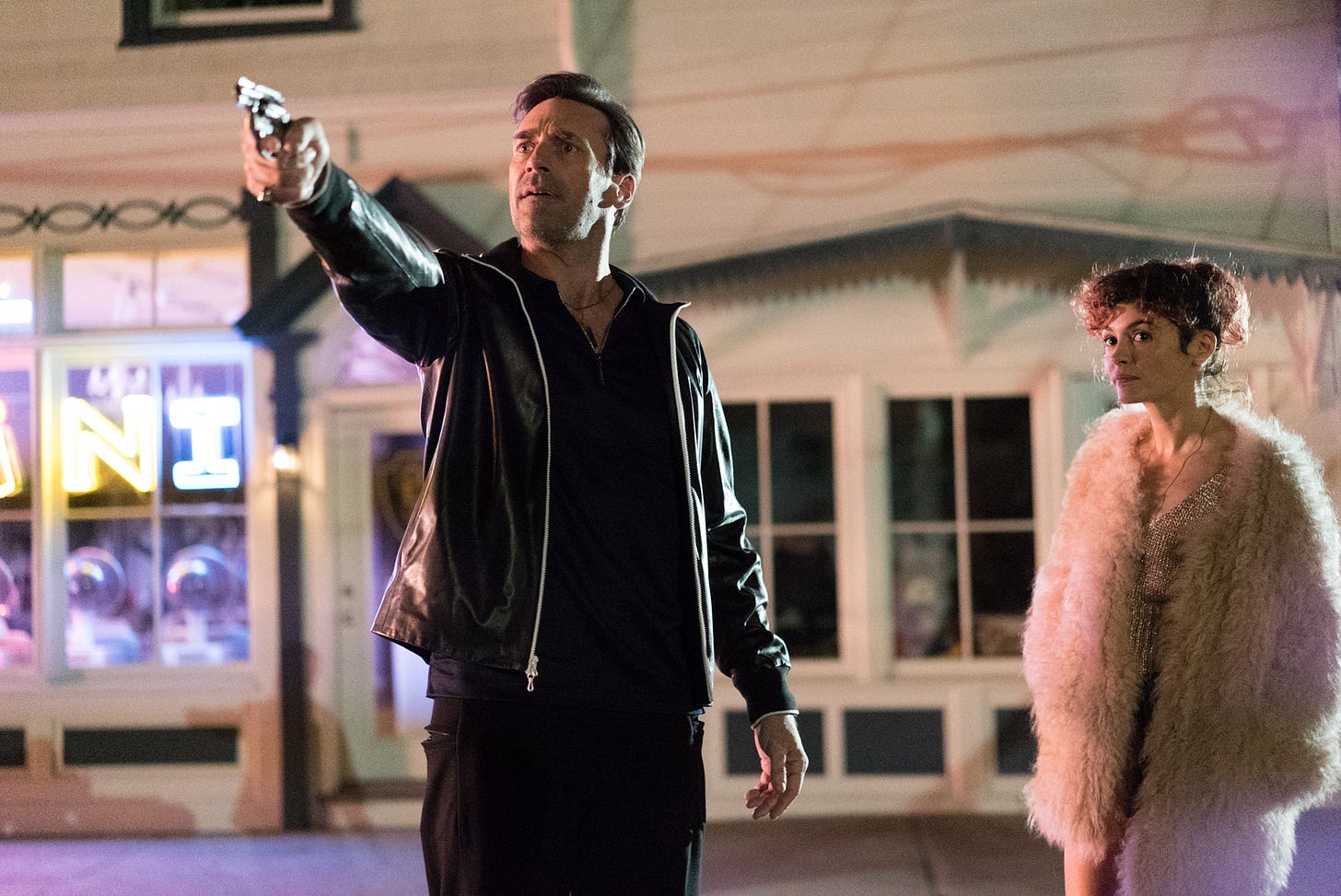
I suppose there’s now a Big Lebowski Cinematic Universe? Do you remember John Turturro’s Jesus, the purple-clad licker of bowling balls and convicted sex offender? He was The Dude’s nemesis on the bowling lanes, and now, twenty years later, has his own movie. I’d heard bad things about this spinoff, which Turturro directs, but figured it was worth a shot for 85 minutes of my time and 99 cents of my money. I don’t regret watching it — there are some funny bits, there are some poignant bits, and there are a few great cameos — but don’t plan on revisiting it anytime in the next decade.
For anyone wondering: No, The Dude does not appear. Jon Hamm is pretty great as the straightest and vainest male hairdresser since Warren Beatty in Shampoo though. So there’s that.
Hope and Glory (1987, d. John Boorman) (Watched on Blu-Ray, mysteriously absent from streaming)
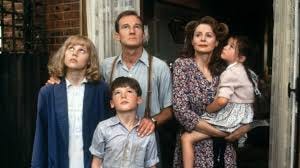
John Boorman is several of my favorite directors. How did one man direct films as different as Point Blank, Excalibur, Deliverance, Zardoz, and this? Hope and Glory is an autobiographical film about growing up in London and its suburbs during the Blitz. The movie covers roughly a year in the life of ten-year-old Billy Rowan and his family. Billy’s too young for the war; his father’s too old to be an officer and ends up a clerk; his older sister pines for soldiers and his mother pines for her husband’s best friend. Billy collects shrapnel from the street and runs wild through bombed-out houses. Despite its wartime setting, this is a gentle, nostalgic movie; its episodic structure, slightly heightened reality, and mildly elegiac tone reminded me of nothing so much as Fellini’s Amarcord.
Hope and Glory would have become a new favorite whenever I watched it, but this year’s circumstances made it unusually poignant: The kids trooping to the shelter in their gas masks plays differently today. Early in the film, as Bill and his family shelter during a German raid, the young boy, already a connoisseur of the Blitz, narrates what he’s hearing. “Flak,” he murmurs, “carpet bombing.” Forty years from now, will they make a tender, wry coming-of-age in coronavirus film? Will, decades on, today’s children have the same feelings about “PPE” and “social distancing” and “flatten the curve” that my parents’ generation have about “duck and cover”? Perhaps, but that may be a privilege of those lucky enough not to lose a loved one or a livelihood.
Star Trek: Discovery (Seasons 1 and 2) and Star Trek: Picard (Season 1)
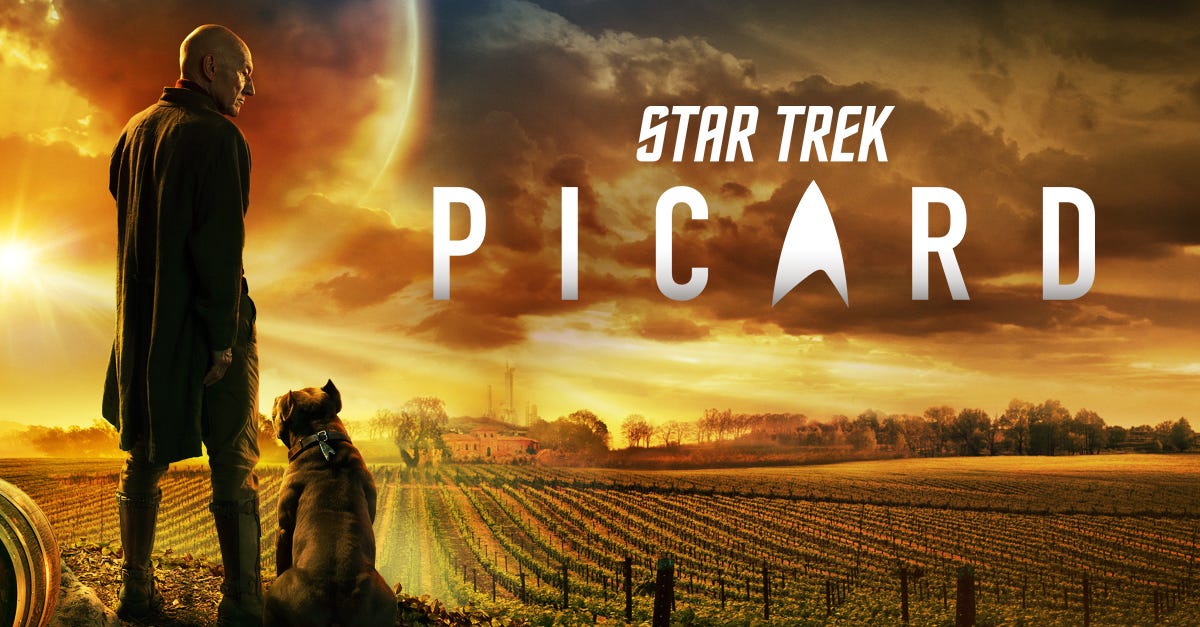
If I’ve watched three Star Trek movies and three seasons of Star Trek television during quarantine, does this mean I’m becoming a Trekkie?
For anyone wondering: Discovery is a lot of fun but relies a lot on hand-waving and plot holes; the cast is talented but forever subordinate to the plot. The USS Discovery’s mushroom-powered space travel is hard enough to accept; much worse is the throwaway assertion that twenty-third century humans will remember Elon Musk as a great pioneer. I’ll still watch season three when it appears.
Picard annoyed early viewers with slow pacing and serious darkness; those problems are less apparent when binge-watched in a dark time, and there’s a comfort to seeing Patrick Stewart back in a captain’s chair. The first season’s plot wrapped up pretty cleanly; I’m curious where the next one goes. I’m a little disappointed that Michael Chabon won’t be returning as showrunner — I just like the idea of a Pulitzer winner running a Star Trek show.
